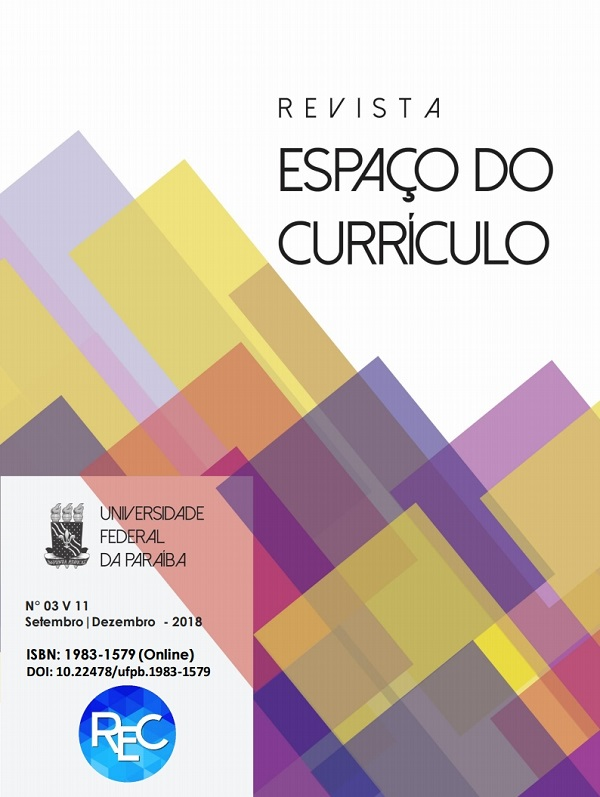HUMAN RIGHTS EDUCATION AND BNCC
socioemotional competences and environmental ethics
DOI:
https://doi.org/10.22478/ufpb.1983-1579.2018v3n11.40385Keywords:
Environmental Education, BNCC, Human Rigths, Socioemotional Competences, Human Rights EducationAbstract
The article aims to understand the relationship between environmental ethics and socioemotional competences foreseen in the National Common Curricular Basis (BNCC), aligned with Human Rights Education (EDH), Global Citizenship Education (ECG) and Environmental Education. Thus, the concepts of EDH and ECG are presented, situated in the legal frameworks that establish them and how they dialogue with the development of socialemotional skills aimed at education in the 21st century, that is, that goes beyond cognitive competences. In line with this theoretical and legal framework, the BNCC presents a set of general competencies that aim precisely at the development of these skills, including the elements and values of human rights and environmental sustainability. However, it is necessary to establish the moral and ethical values that should guide this education, so that it breaks with anthropocentrism and does not incur any form of oppression, either in relation to humans, animals or nature.
Downloads
Metrics
References
BRASIL. Comitê Nacional de Educação em Direitos Humanos. Plano Nacional de Educação em Direitos Humanos. Brasília: Secretaria Especial dos Direitos Humanos, Ministério da Educação, Ministério da Justiça, UNESCO, 2007. Disponível em: <http://portal.mec.gov.br/index.php?option=com_docman&view=download&alias=2191-plano-nacional-pdf&category_slug=dezembro-2009-pdf&Itemid=30192 >. Acesso em: 8 mar. 2018.
______. Constituição (1988). Constituição da República Federativa do Brasil de 1988. Disponível em: <http://www.planalto.gov.br/ccivil_03/Constituicao/Constitu icao.htm> Acesso em: 12 abr. 2016.
______. Lei no 9.795, de 27 de abril de 1999. Dispõe sobre a educação ambiental, institui a Política Nacional de Educação Ambiental e dá outras providências. Diário Oficial da União, Brasília, 28 de abril de 1999. Disponível em: <http://www.planalto.gov.br/ccivil_03/leis/L9795.htm>. Acesso em: 1 jun. 2018.
______. Ministério da Educação. Base Nacional Comum Curricular. Brasília: MEC, 2018.
______. Secretaria de Direitos Humanos da Presidência da República. Educação em Direitos Humanos: Diretrizes Nacionais. Brasília: Coordenação Geral de Educação em SDH/PR, Direitos Humanos, Secretaria Nacional de Promoção e Defesa dos Direitos Humanos, 2013.
CASARIN, Tônia. O que você precisa saber sobre Inteligência Emocional e Social? 2016 Disponível em: <https://www.toniacasarin.com.br/o-que-voce-precisa-saber-sobre-inteligencia-emocional-e-social/>. Acesso em: 8 mar. 2018.
DELORS, Jacques. Educação: um tesouro a descobrir. Relatório para a UNESCO da Comissão Internacional sobre Educação para o século XXI. UNESCO: Brasília, 2010. Disponível em: <http://unesdoc.unesco.org/images/0010/001095/109590por.pdf>. Acesso em: 15 jan. 2018.
FELIPE, Sônia T. Fundamentação ética dos direitos animais: O legado de Humphry Primatt. In: SANTANA, Heron José de; SANTANA, Luciano Rocha (Coord). Revista Brasileira de Direito Animal. Salvador: Instituto de Abolicionismo Animal, ano 1, n 1, jan-dez 2006.
______. Por uma questão de princípios: alcance a limites da ética de Peter Singer em defesa dos animais. Florianópolis: Boiteux, 2003.
LAPA, Fernanda Brandão. Clínica de Direitos Humanos: uma proposta metodológica para a educação jurídica no Brasil. Rio de Janeiro: Lúmen Juris, 2014.
LAPA, Fernanda Brandão; RODRIGUES, Horácio Wanderlei. Educação em Direitos Humanos: marcos legais e (in)efetividades. Revista Direitos Sociais e Políticas Públicas – UNIFAFIBE, vol. 4, p. 181-226, 2016.
LEMANN CENTER. Base Nacional Comum Curricular. Parte I: Implementação da BNC: Lições do “Common Core”. Por David Plank, 2016.
ONU. Resolução 49/184. Década das Nações Unidas para a Educação em matéria de Direitos Humanos – 1995-2004. ONU: 1994.
______. Resolución 66/137 aprobada por la Asamblea General el 19 de diciembre de 2011, “Declaración de las Naciones Unidas sobre Educación em Materia de Derechos Humanos”. ONU: 2011.
REIMERS, Fernando. Educating for Global Competency. 2009a
______, Fernando. It's Time to Teach Human Rights. In: Harvard Ed. Magazine, Winter 2009b. Disponível em: <https://www.gse.harvard.edu/news/ed/09/01/its-time-teach-human-rights>. Acesso em: 15 mar. 2018.
ROSENDO, Daniela. Sensível ao Cuidado: Uma perspectiva ética ecofeminista. Curitiba: Prismas, 2015.
SALZBURG GLOBAL SEMINAR. Session 566, Salzburg, December 4 to 9. Getting Smart: Measuring and Evaluating Social and Emotional Skills, 2016.
UNESCO. Educação para a cidadania global: a abordagem da UNESCO. Brasília: ONU: 2015a.
______. Educação para a cidadania global: preparando alunos para os desafios do século XXI. Brasília: UNESCO, 2015b.
WARREN, Karen. Ecofeminist Philosophy: A Western Perspective on What It Is and Why It Matters. Rowman & Littlefield Publishers, 2000.
Downloads
Published
How to Cite
Issue
Section
License
By submitting an article to Curriculum Space Journal (CSJ) and having it approved, the authors agree to assign, without remuneration, the following rights to Curriculum Space Journal: first publication rights and permission for CSJ to redistribute this article. article and its metadata to the indexing and reference services that its editors deem appropriate.
















